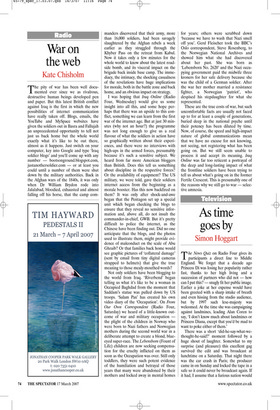War on the web
Kate Chisholm
The pity of war has been well documented ever since we as rivalrous, destructive human beings developed pen and paper. But this latest British conflict against Iraq is the first in which the new possibilities of internet communication have really taken off. Blogs, emails, the YouTube and MySpace websites have given the soldiers out in Basra and Fallujah an unprecedented opportunity to tell not just us back home but the whole world exactly what it’s like to be out there, almost as it happens. Just switch on your computer, key into Google and type ‘Iraq soldier blogs’ and you’ll come up with any number — bootsonground.blogspot.com, justanothersoldier.com — or at least you could until a number of them were shut down by the military authorities. Back in the Afghan wars of the 1840s, it was only when Dr William Brydon rode into Jalalabad, bloodied, exhausted and almost falling off his horse, that the camp com manders discovered that their army, more than 16,000 soldiers, had been savagely slaughtered by the Afghan rebels a week earlier as they struggled through the Khyber Pass on the retreat from Kabul. Now it takes only a few minutes for the whole world to know about the latest roadside bomb, and its visceral impact on the brigade back inside base camp. The immediacy, the intimacy, the shocking casualness of the revelations have huge implications for morale, both in the battle zone and back home, and an obvious impact on strategy.
I was hoping that Iraq Online (Radio Four, Wednesday) would give us some insight into all this, and some hope perhaps that there was an upside to this conflict, something we can learn from the first war of the internet age. But at just 30 minutes (why not an hour?) the programme was not long enough to give us a real flavour of what the soldiers in action have so graphically written about their experiences, and there were no interviews with high-ups in the armed forces, presumably because it’s such a sensitive subject. We heard from far more American bloggers than British. Does this tell us something about discipline in the respective forces? Or the availability of equipment? The US military, we were told, gave their soldiers internet access from the beginning as a morale booster. Has this now backfired on them? It was only after shock-and-awe began that the Pentagon set up a special unit which began checking the blogs to ensure that they reveal no sensitive information and, above all, do not insult the commander-in-chief, GWB. But it’s pretty difficult to police the internet, as the Chinese have been finding out. Did no one anticipate that the blogs, and the photos used to illustrate them, might provide evidence of malconduct on the scale of Abu Ghraib? Or that families back home would see graphic pictures of ‘collateral damage’ (sent by email from tiny digital cameras strapped to helmets) that give the true meaning to those mealy-mouthed words?
Not only soldiers have been blogging to the world from Iraq. ‘Riverbend’ began telling us what it’s like to be a woman in Occupied Baghdad from the moment that Saddam’s statue was pulled down by US troops. ‘Salam Pax’ has created his own video diary of the ‘Occupation’. On From Our Own Correspondent (Radio Four, Saturday) we heard of a little-known outcome of war and military occupation the plight of the children in Norway who were born to Nazi fathers and Norwegian mothers during the second world war in a deliberate attempt to create a blond, blueeyed super-race. The Lebensborn (Fount of Life) children are now seeking compensation for the cruelty inflicted on them as soon as the Occupation was over. Still only toddlers, they were such potent evidence of the humiliation and betrayal of those years that many were abandoned by their mothers and locked away in mental homes for years; others were scrubbed down ‘because we have to wash that Nazi smell off you’. Gerd Fleischer took the BBC’s Oslo correspondent, Steve Rosenberg, to the Norwegian National Archives and showed him what she had discovered about her past. She was born as ‘Lebensborn No. 2620’ and the Nazi occupying government paid the midwife three kroners for her safe delivery because she was the child of a German soldier. After the war her mother married a resistance fighter, a Norwegian ‘patriot’, who despised his stepdaughter for what she represented.
These are the true costs of war, but such uncomfortable facts are usually not faced up to for at least a couple of generations, buried deep in the national psyche until their potency has been diluted by time. Now, of course, the speed and high-impact nature of global communications mean that we have no excuse for not knowing, not seeing, not registering what has been going on. But we still seem unable to process it and accept its meaning. Iraq Online was far too reticent a portrayal of the deep and long-lasting impact of what the frontline soldiers have been trying to tell us about what’s going on in the former Fertile Crescent. This is presumably one of the reasons why we still go to war — selective amnesia.


































































































 Previous page
Previous page